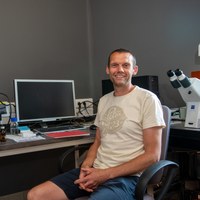The MMM staff
|
|
Xavier De Bolle, Full ProfessorIn our team, we study essential processes in the molecular biology of the pathogen Brucella abortus, a zoonotic pathogen with a strong intracellular tropism. During its infectious cycle, B. abortus is expected to meet different stresses to which the bacterium is adapted. Beyond its ability to survive these stresses, the bacterium needs to grow in its host before being transmitted to the next host. Therefore, growth and stress response are two key factors for the success of B. abortus infectious cycle. A better knowledge of the associated molecular mechanisms will improve our basic knowledge allowing the next generation to choose the best possible treatments in the future.
|
||
|
|
Jean-Yves Matroule, Associate Professor
|
||
|
|
Francesco Renzi, Research Associate
Our main model organisms are: Capnocytophaga canimorsus, a commensal of dogs and cats’ mouth that causes generalized infections with a high mortality rate in humans that have been bitten, scratched, or licked by a dog; and Flavobacterium johnsoniae, a free living fresh-water and soil bacterium.
|
||
|
|
Régis Hallez, Research AssociateOur group is interested in understanding how bacteria respond to stress and regulate their cell cycle by combining genetic and biochemical approaches. Our bacterial models include both alpha-proteobacteria (the free-living Caulobacter crescentus; the plant pathogen Agrobacterium tumefaciens; the intracellular pathogen of mammals Brucella abortus) and gamma-proteobacteria (the nosocomial, multidrug resistant (MDR) and opportunistic pathogen Acinetobacter baumannii; the uropathogenic E. coli (UPEC) and the intracellular pathogens Salmonellae). Link: https://www.urbm.be/research-groups/regis-hallez |
||
|
|
Gipsi Lima Mendez, Assistant ProfessorMy research currently focuses on the study of interactions between bacteria and mobile genetic elements (MGEs), (i.e. bacteriophages, plasmids, transposons, etc) in the ocean and gut microbiomes using a combination of bioinformatics, microbiology, biochemistry and microbial ecology methods. Specific interests are the functional characterization of genes of unknown function in bacteria and bacteriophages, the development of network-based analytical frameworks to model ecological interactions, evolutionary relationships among MGEs and propose classification methodologies for MGEs and the study of the interactions among MGEs sharing/infecting the same host. Link: https://www.urbm.be/research-groups/gipsi-lima-mendez |






